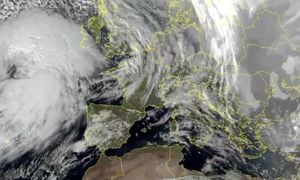The French government is facing intense scrutiny as it navigates the debate over the 2025 budget, with significant concerns about the public deficit looming large over economic planning. The discussion was particularly heated recently as various political factions expressed their stances on the proposed financial plan, which aims to reduce the expected budget deficit to 5.4% of GDP by 2025 from projected figures closer to 6% for 2024.
On January 24, Amélie de Montchalin, the Minister Delegate for Public Accounts, raised alarms about potential losses to the French public arising from failed funding initiatives, labeling the clamor for censure against the government as detrimental. "La censure du gouvernement Barnier a un coût de 12 milliards d'euros pour les Français," she told Franceinfo, underscoring the financial repercussions of political actions on public welfare. "Notre réveillon à tous nous a coûté 6 milliards au 1er janvier, et depuis, c'est 100 millions par jour, sur deux mois, c'est 12 milliards d'euros de gâchis," she added, illuminating the continuous strain on financial resources.
The recent political maneuverings resulted positively with the Senate passing the budget proposal by 217 votes to 105 on January 23. Yet, the application of this budget is fraught with challenges. Bayrou's administration, tasked with tightening the national purse strings, faces strong opposition from leftwing parties and environmentalists, particularly as they argue against cuts hurting social programs and initiatives.
Eric Lombard discussed the delicate balancing act of fiscal responsibility at recent gatherings, aiming to assuage worries about public spending and growth. He explained the slight intended reduction of public expenditure from 56.8% to 56.7% of GDP. Lombard celebrated the passage of the budget through the Senate as indicative of progress, stating, "Ce qui est important dans ce budget, c'est qu'il marque le début de la réduction d'une phase de déficit excessif," yet warned of the hurdles yet to be overcome.
Critiques from within the government ranks underline fissures and tensions. Pierre Moscovici, the former finance minister who now leads the Public Finance High Council, made sharp remarks during the assembly investigations concerning the management of recent deficits, deeming some economic forecasts "à la limite de l’insincérité" during his testimony. This prompted responses from fiscal officials and other lawmakers, all eager to frame the upcoming legislative sessions.
MPS from various parties noted the governmental necessity of finding 32 billion euros from spending cuts and generating another 21 billion from revenues to meet deficit targets. The upbeat forecasts, expected to buoy the ruling coalition, also carry critiques from burgeoning factions within the assembly, with political figures like Marine Tondelier of the Ecologists vehemently opposing the budget, stating, "On va voter la censure et on va le faire savoir très fortement" to signal their deep disapproval of the current financial trends and cuts.
Tensions between the factions have escalated as the weeks progressed, particularly surrounding discussions related to environmental funding and social equity initiatives. The left, weaving its narratives against austerity measures, is aiming to showcase how the proposed budget overlooks pressing socio-environmental issues, challenging the perceived conservativeness of the government's approach.
Looking forward, the upcoming meetings scheduled for January 30 could either pave the way for compromise or lead to more pronounced rifts. With each party lobbying for either massive cuts or protective measures, the budget is still subject to alterations before its final vote scheduled for early February. The chamber's decisions play pivotal roles as the government attempts to pull the nation back from the brink of excessive deficit states mandated by Brussels and maintain solid fiscal credibility.
With continued discussions, the government's path seems just as winding as the initial proposals of the 2025 budget. The stakes are undoubtedly high, as both taxpayers and public service beneficiaries eagerly await the outcome. The results of these negotiations not only determine future budget allocations but also understandings of how France will tackle its looming public finance hurdles with compounded historical contexts and pressing current realities.
Indeed, much rides on the understandings of representative dynamics as these factions continue to negotiate the path forward—the international demand for fiscal accountability, coupled with domestic social pressures for equitable budget action, heralding one of the significant tests of governance for the future.



